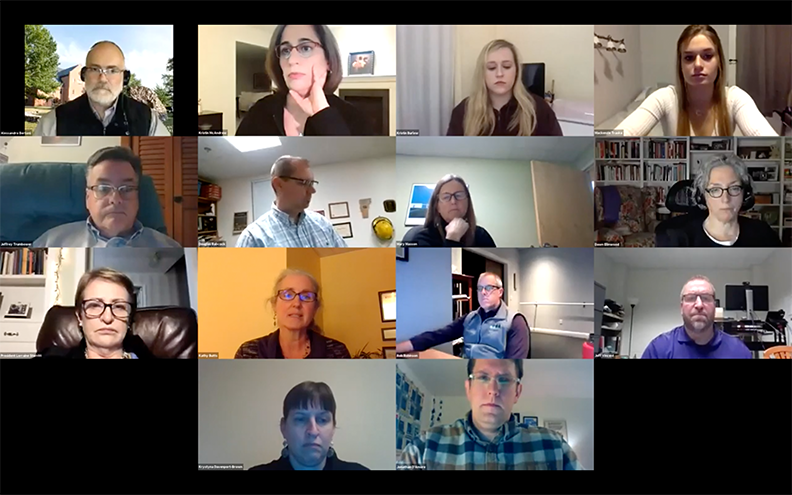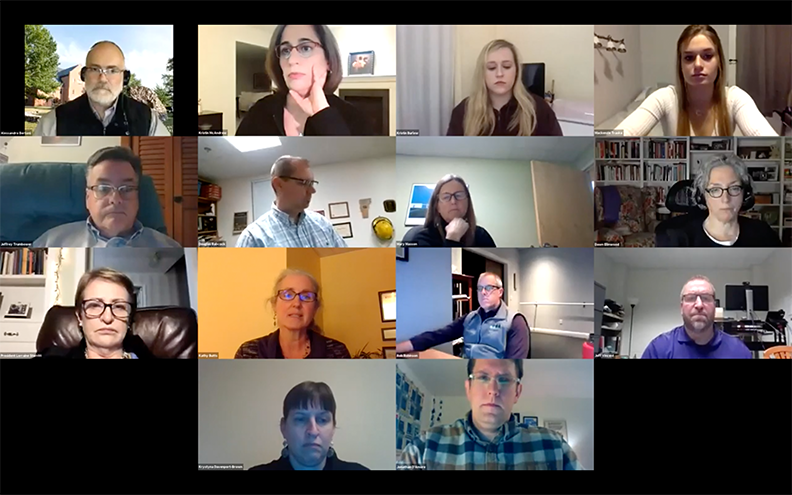
By Ashley DeLeon
Executive Editor
Preparations for the Spring semester are underway, and the Saint Michael’s College administration is mandating the adherence of stricter COVID-19 guidelines this up-coming semester compared to the Fall.
On Jan. 13 at 4:30 p.m., the Emergency Planning Group (EPG) hosted a Town Hall to provide students with information about COVID-19 guidelines for the Spring semester.
“New and updated policies are created to benefit the student body,” said Lorraine Sterritt, president of Saint Michael’s College. Though new strains of the virus are more infectious, Sterritt shined light on the anticipated effectiveness of vaccines. “New strains are more infectious. The good news is that the vaccines are expected to be effective against them,” she said.
Mary Masson, executive director of Bergeron Wellness Center, says the virus’ impact in our community and state is being watched carefully. “Although the COVID rate is lower than three percent, we’re watching it with concern,” she said. “Last week’s numbers equaled the total number of cases from May to October. Why we’ve done so well is because we have a very conservative commissioner and governor. It is the reason behind things we’ll do moving forward.” Decision making from the State of Vermont is the reason why many of the College guidelines are in place, Masson explained. She specified that Saint Michael’s College follows directives from the State of Vermont, though there may be discrepancies with the CDC (Centers for Disease Control).
For individuals who were diagnosed with COVID-19 over winter break, the College requests a copy of the testing result sent to mmasson@smcvt.edu for medical record purposes. Those who were previously diagnosed do not need to undergo surveillance testing for a full 90 days. Administration will notify these individuals when they are due for testing. Though surveillance testing may not be mandatory for this time period, they are expected to follow all other COVID-19 guidelines on campus, Masson explained.
If someone has fallen ill or is a contact of a positive case, quarantine will occur in Ryan Hall, differing from the College’s previous policy of quarantine inside of an individual’s Fall housing. Contacts with a history of a COVID infection within the past 90 days are still required to undergo a full quarantine. This guideline is mandated by the VT Department of Health.
The full duration of isolation is 10 days, with a planned release on Day 11. If symptoms are developed during isolation, “the clock restarts and it becomes 10 days from the start of symptoms,” Masson noted. “There is a new strain coming out of the UK called the B117 strain, which is more contagious. They are finding that because it’s more contagious, it can affect larger communities, increasing the risk for a larger subset of the community to be hospitalized,” she warned. Luckily, testing provided by the Broad Institute can detect this specific strain.
According to Masson, Mark Levine, Vermont Health Commissioner, stated that no plan is in place for college students to receive the vaccine until the late spring or early summer at this point in time. If there is an uptick in doses or more companies approved by the FDA for vaccination administration, then this may change. “The COVID vaccine does not prevent us from being exposed to the virus or potentially sharing it with our community. It won’t be effective until 70% of the population receives it. If you get the vaccine, you must still continue the guidelines of testing, quarantining, masking, etc.” Masson said.
”We learned a lot from the Fall,” said Dawn Ellinwood, vice president for student affairs. A survey conducted by the Student Government Association (SGA) provided the EPG with feedback and data to consider in their Spring semester planning.
“We have received lots of feedback and data recently. The SGA leadership met with the EPG group from a survey they just did. We are continuing to work and there are works in progress. It was important for the EPG to share what we have so far and it may not change a lot, but it may,” she said.
Ellinwood notes the biggest protocol change is the mandate for quarantine in Ryan Hall. “Meals will be delivered, and the hall will have more pantries. We are trying to make that space more than it was in the Fall,” she said. Additionally, are encouraged to only socialize with their households.

Testing changes
Faculty and staff are encouraged to receive testing weekly on Tuesdays and Wednesdays from 9 a.m. to 2 p.m., though testing is not mandatory.
“The configuration of what you experienced last semester will be different. Testing will be conducted around the track, because the numbers of people coming in will be dramatically different.” Students must bring their KnightCards to testing, as they will be swiped upon entry to record attendance. “If you do not show up, we will find you,” Ellinwood warned.
The virus is fully expected to be present on campus upon arrival, therefore, the precaution and vigilance are crucial until the arrival testing is completed.
Mental Health and Wellness
Kathy Butts, director of counseling at Bergeron, encourages students to contemplate whether returning to campus in-person is in their best interest. “When you think about coming back, knowing what the challenges are, think about how that will work for you and if you have the supports and capacities available to take on that challenge,” she said. Butts notes that learning remotely can be beneficial for many students.
If anyone is in need of support in making this decision, reach out to kbutts@smcvt.edu.
In addition, individual counseling will be available by appointment, and urgent needs can be accommodated on the same day.
Communication and messaging
Alex Bertoni, director of marketing and communications, explained new changes to the College website. There is a new section titled Information and Resources, with newly integrated alert levels. “Alert levels give people a level of where we’re at. Some of the requirements for orange are spelled out there. If there is a lower incidence of COVID, we can get to yellow.” The administration can’t specify what guidelines can be relaxed with yellow and green levels, as they may be subject to change. To access the dashboard, it will no longer be linked on the landing page. It can be found under COVID Alert Levels.
Additionally, information that defines terms such as “household,” further details of quarantine and isolation, and information about hygiene can be found on this page.
Academics
Jeffrey Trumbower, vice president for academic affairs and professor of Religious Studies, reminded students that classes begin virtually on Jan. 25, for those who quarantined both at home and on campus. Classes with in-person components are expected to begin on Feb. 4.
“We didn’t plan break days well in the Fall because we never experienced a semester where the only break day was in the middle of the week. There was a sense of not having any breaks, and we stressed to faculty that break days are actually break days, and no assignments should be due the day after or the day of,” he said. Department and committee meetings should not meet either, as these are meant to be breaks from the normal routine.”
If a student is contemplating remote learning for the semester, they must contact Tim Mackin, Associate Dean of the College.
“One caveat is that not every course is available remotely. One-third are fully virtual, one-third are mixed, and one-third are in person. Some mixed and in person models can make accommodations for fully remote students, however. It is not too late to decide if you want to be virtual,” Trumbower stated.
The EPG later addressed specific questions submitted by students, highlighting, re-iterating, and supplementing specific information previously provided in the informational session.
For more information on health and safety protocols for the Spring semester, visit https://www.smcvt.edu/return-to-campus/

